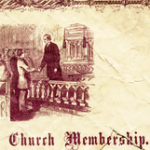 Article: The Encouragement of Congregational Singing by Dustin J Coleman (original source here)
Article: The Encouragement of Congregational Singing by Dustin J Coleman (original source here)
One of the great gifts that God has given His church is the gift of congregational singing. I often come to our worship gathering discouraged – discouraged with my failures, my anxieties, and my weakness. What a gift the gathered church is to a discouraged soul! Every week we come in from our different lives and gather to, among other things, sing the glory and power of the gospel.
This hit home for me at a recent worship gathering of our church. As I sang the songs and thought about the people who were singing around me, my heart was invigorated with the joy of the victory of the gospel.
I saw a woman many of us affectionately call “Grandma Kay.” Kay is in her 90s and suffers from several debilitating weaknesses that come along with being of advanced age. She seems weaker with each passing week and I know the day of her passing is not far away. And yet here she is, sitting (because she can’t stand) and singing with us:
And on that day when my strength is failing
The end draws near and my time has come
Still my soul will sing Your praise unending
Ten thousand years and then forevermore!
This is a victory cry! Throughout the winding years of decades, neither old age nor the pains of impending death have been able to rob Grandma Kay of her joy. Neither life nor death has been able to separate her from the love of God in Christ Jesus our Lord.
And then I see Mary, a single, divorced woman in her mid-50s. She often jokes that Christ had to wear gloves when He reached out to save her, so deep was the filth of her debauchery. Her voice joins all of ours as we sing:
O perfect redemption! The purchase of blood
To every believer the promise of God
The vilest offender who truly believes
That moment from Jesus a pardon receives.
This is a victory cry! Her voice joins the chorus that proclaims that there is no depth of muck and sin that the depth of Christ’s grace and mercy is not deeper still. Sin’s grip is no match when God decides to wrest His children free.
And then I see Ryan, a young single man in our congregation. Ryan is coming out of a very difficult past, a past of drug addiction, alcohol, and sexual sin. But, praise God, he is fighting! He is fighting but there are days of failure. But here he is, standing in the row behind me, as we sing these words:
Christ the sure and steady anchor
While the tempest rages on
When temptation claims the battle
And it seems the night has won
Deeper still then goes the anchor
Though I justly stand accused
I will hold fast to the anchor
It shall never be removed.
This is a victory cry! Sin has won so long in his life and it drove him deeper and deeper into despair. But now he meets those failures with faith, clinging to Christ, trusting in His justifying death, and longing for the light of day to conquer the night.
And I see Eva. Eva immigrated to the United States from India, where her daughters still live. She works the third shift at 7 Eleven so that she can send money back home. Even amidst the spiritual darkness of India, gospel light found her. I see her standing, with eyes closed and hands open toward the sky singing:
Let every kindred, every tribe
On this terrestrial ball
To Him all majesty ascribe
And crown Him Lord of all!
This is a victory cry! Satan is bound and he no longer holds the nations captive in ignorance and sin. The gospel is going forward and Christ is ransoming people for God from every tribe and tongue and people and nation. Eva is a ringing cry that Satan is beaten and Christ’s great kingdom shall reign on earth.
I hear these people singing and I am reminded of the victory and power of the gospel. There is no weakness, no stain of sin, no power of temptation, no spiritual darkness that can ever conquer the power of God working in the lives of His people. Their voices remind me of the freedom and victory and joy of God’s people. The melody of their hearts tunes my troubled soul to the song of God’s triumph.
And in their singing, I am helped and my soul is lifted to God. May we remember the treasured gift of singing that God has given His people!


